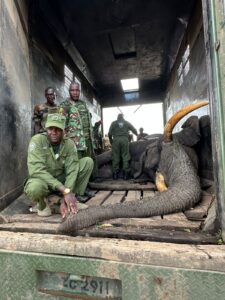The fourth quarter of 2018 was very productive for MEP rangers and our government partners the Kenya Wildlife Service (KWS) and Narok County Government (NCG). On December 23, MEP rangers along with our government partners arrested two poachers and seized 69 kg of ivory. Through our intelligence network, we got a lead that these two large tusks were going to be transported to market. The Naroosura ranger unit intercepted the poachers after leaving Loita on their way to Naroosura where the arrest was promptly made by KWS. This was the single largest ivory seizure in 2018.
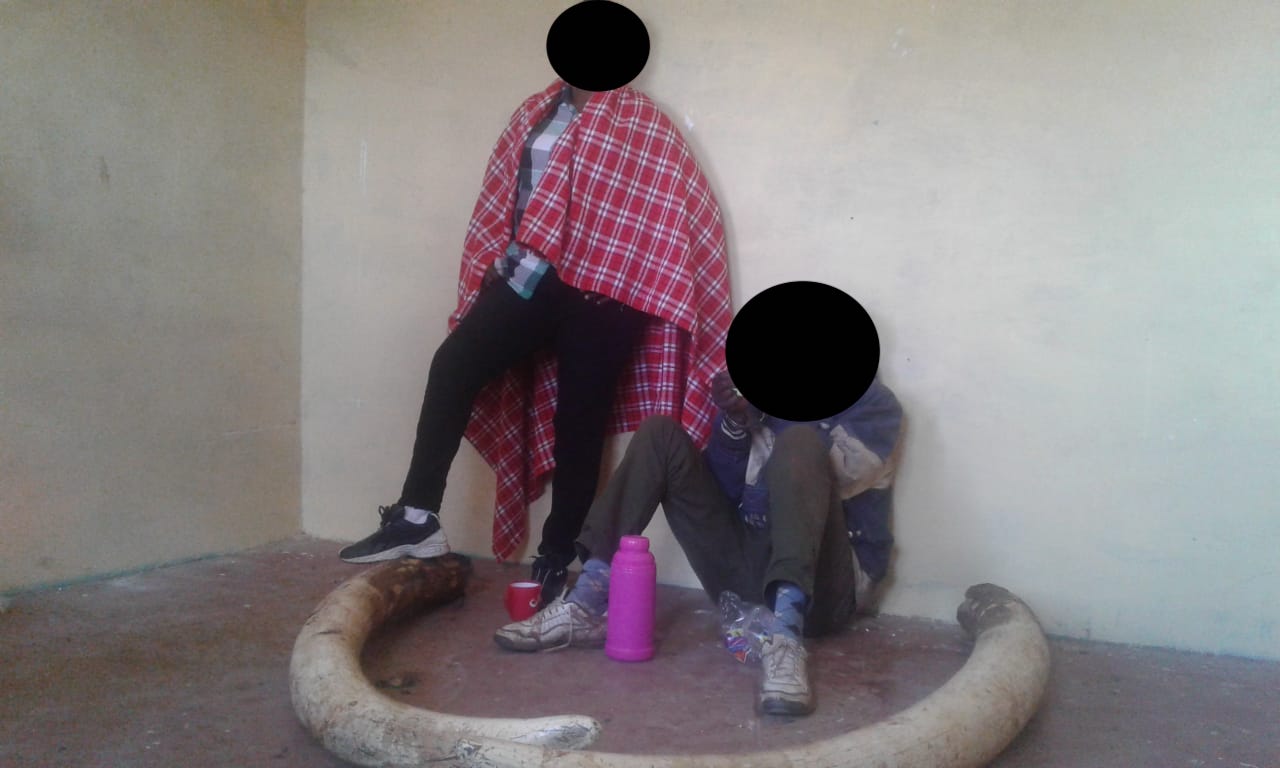 The two suspects arrested with 69 kg of ivory.
The two suspects arrested with 69 kg of ivory.
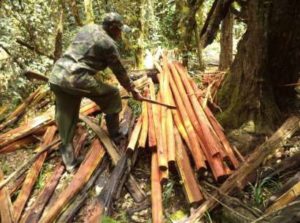
Overall, in the fourth quarter, MEP’s rangers, along with government partners KWS and NCG, have arrested eight poachers, seized 72 kg of ivory, responded to 42 incidents of human-elephant conflict, removed 102 harmful snares and shutdown five illegal logging sites (pictured left), arrested 10 illegal logging suspects, destroyed nine kilns, confiscated eight sacks of charcoal, 9 kg of bushmeat and arrested four bushmeat poaching suspects.
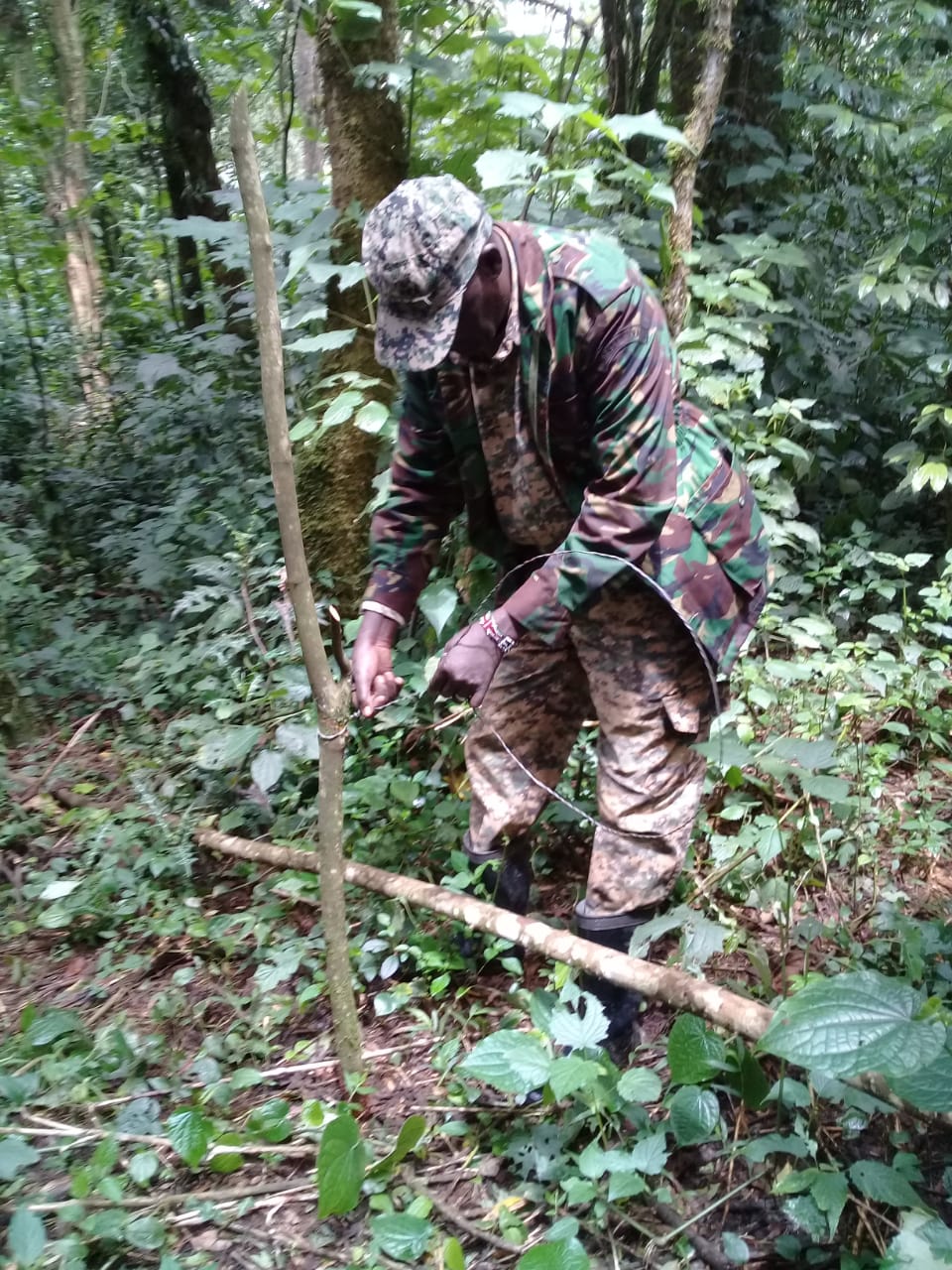
A ranger with the MEP DSWT Mau De-Snaring Unit removing a snare in the Mau Forest.
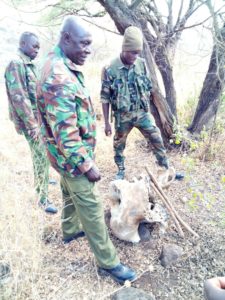
In October, we moved one of our rapid response teams to the northern end of the Loita Hills near Naarosora Center. This team worked flat-out to address a number of conservation issues in this area from illegal logging to bushmeat and elephant poaching. The rapid response team found a dead elephant with tusks removed in the Naasoroa/Engata Entirit area north of the Loita Hills forest (pictured left). Using intelligence gathered in the area we investigated and after a number of ground patrols, the team also found a carcass of a poached elephant which had been concealed with cut branches.
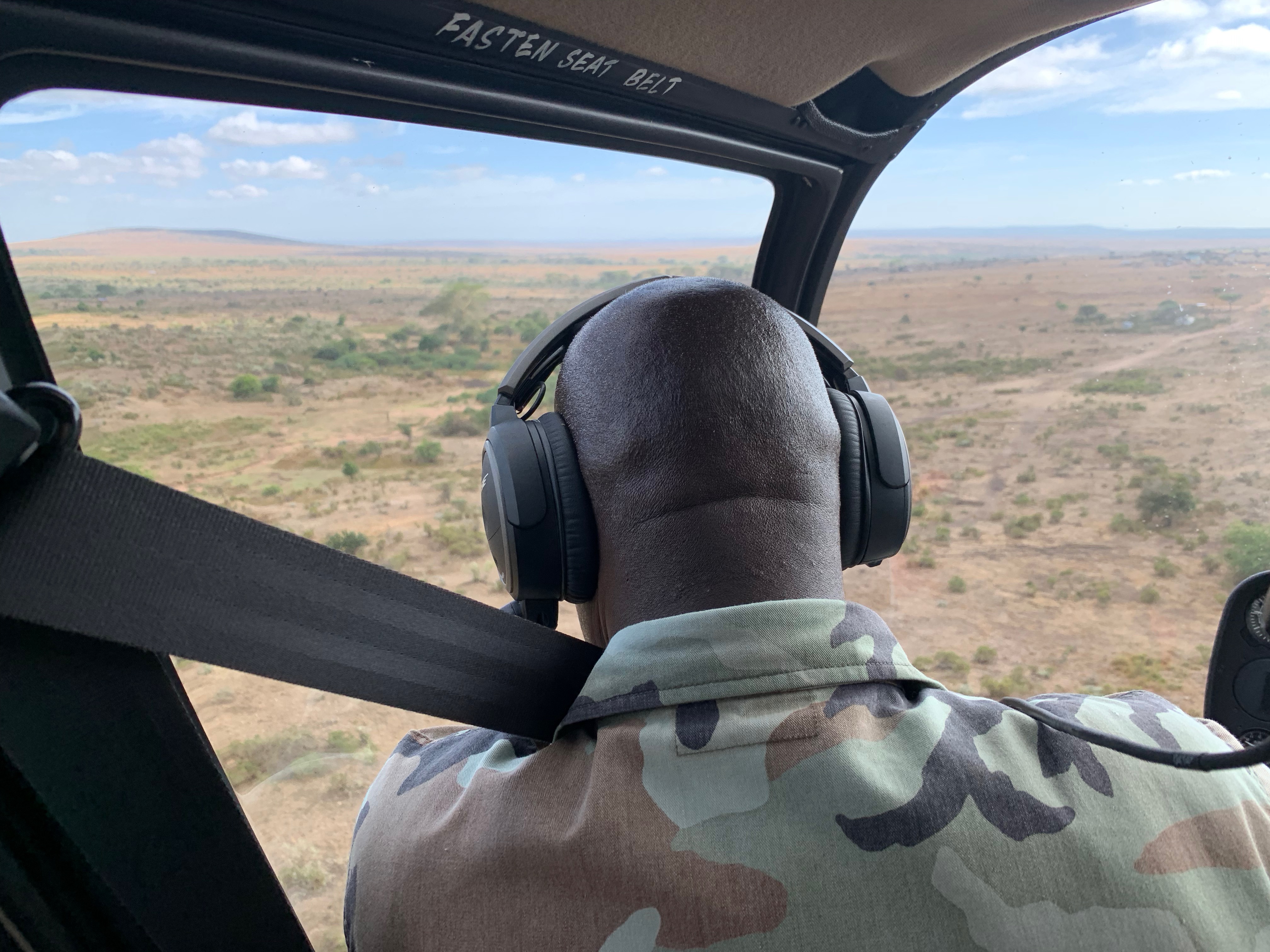
MEP Warden Jame Ekiru surveying the Loita area from the helicopter.
The high number of illegal activities is concerning as a mega herd of elephants was found by our team near Naroosura, and they have been keeping a close watch over them. In November, we uncovered an illegal cedar logging syndicate in the area and recovered posts, most of which were donated to local primary schools to build wildlife proof fences. The team will continue to operate and secure the area. It does clearly indicate a need for a permanent presence of a multi-agency team in this area, which we hope to secure funding for soon.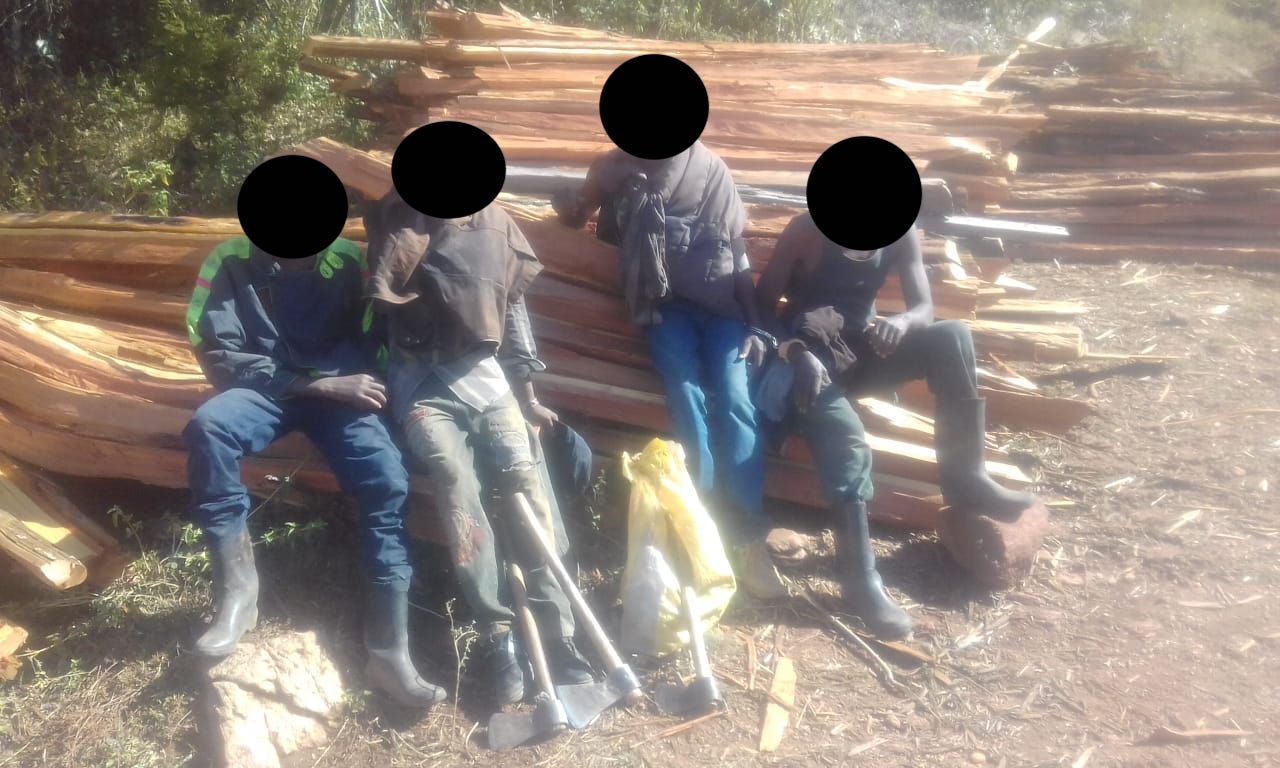
In October, four suspects arrested in Loita by KWS and MEP rangers, in possession of 500 posts.
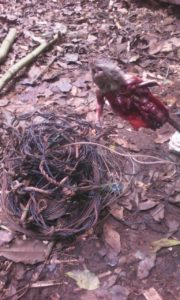
Illegal bushmeat poaching is a problem in Narok County, with the discovery of an illegal commercial bushmeat operation near Naarosora. We have tasked our ranger teams to increase their efforts to address this while on their patrols. They’ve been focusing on removing snares and rooting out commercial bushmeat operations. Through our intelligence network we are seeking to break down the illegal bushmeat operation by arresting them when they come to sell their meat. The David Sheldrick Wildlife Trust (DSWT) Mau De-Snaring Units continues to remove the largest number of snares each month in the Mau Forest, while it seems on the plains, the preferred method is to hamstring animals from motorbikes or shoot them with poisoned arrows. Over the quarter, MEP rangers have removed 102 snares and arrested four bushmeat poachers (pictured left: snares and bushmeat from an arrest).
The fourth quarter started out dry in the Mara; however, welcomed December rains helped make it green. During the dry time, we saw increased conflict at water points, saltlicks, irrigated farms and in kitchen gardens. Our collared elephants Ivy, Hugo, Kegol and Fred have been venturing into farmland in the Transmara, and although there are little to no crops in the fields, the elephants are coming close to settlements to raid anything they can get.
MEP rangers along with our embedded government rangers from KWS and NCG responded to 42 incidents of human-elephant conflict. None of these responses were out of the ordinary as most were moving elephants out of farms, settlements or away from community areas. In most cases MEP rangers were able to use their vehicles and firecrackers to move the elephants to safety; however, the helicopter was needed for more pressing incidents like the one highlighted below where a young elephant was attacked.
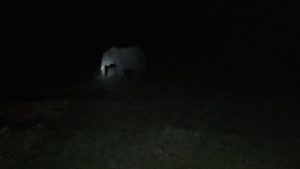 The Oloisukut area was the most active HEC hotspot in December as the area was dry and elephants were moving into community land on their way to get water at the Mara River. Oloisukut Conservancy bordering the Tarakwet area, where crops were ripe, was elephants favorite hiding spot during the day to then crop raid at night. In December, a group of 20 elephants were successfully chased away from the Oloosokon area by the Oloisukut patrol team and the same ranger unit responded all the following night with elephant crop raiding in Tarakwet (pictured left). Additionally, the DSWT MEP Mau De-Snaring Unit continues to mitigate human-elephant conflict with the communities surrounding the Mau Forest as elephants are coming out of the forest at night to raid maize farms.
The Oloisukut area was the most active HEC hotspot in December as the area was dry and elephants were moving into community land on their way to get water at the Mara River. Oloisukut Conservancy bordering the Tarakwet area, where crops were ripe, was elephants favorite hiding spot during the day to then crop raid at night. In December, a group of 20 elephants were successfully chased away from the Oloosokon area by the Oloisukut patrol team and the same ranger unit responded all the following night with elephant crop raiding in Tarakwet (pictured left). Additionally, the DSWT MEP Mau De-Snaring Unit continues to mitigate human-elephant conflict with the communities surrounding the Mau Forest as elephants are coming out of the forest at night to raid maize farms.
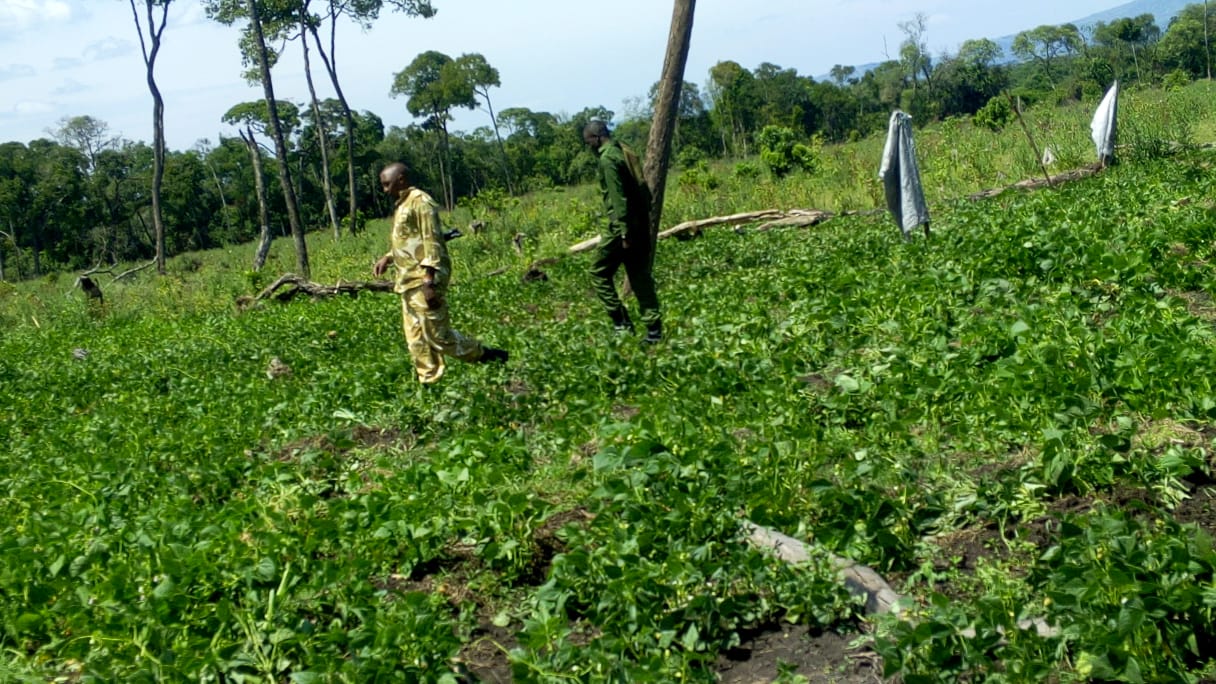 The Oloisukut MEP ranger unit investigating a bean field that had been raided by elephants.
The Oloisukut MEP ranger unit investigating a bean field that had been raided by elephants.
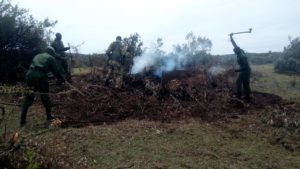 In December, the DSWT Mau De-Snaring Unit uncovered a charcoal operation and destroyed three kilns, confiscated seven sacks of charcoal and destroyed two poacher houses. The Munyas team had similar success when they came across a charcoal operation and destroyed two kilns and five sacks of charcoal (pictured right). We continue our daily monitoring of MEP’s collared elephants and had many good sightings in the fourth quarter of MEP collared elephants including Lempiris, Hangzhou, Fred, Namunyak, Amare, Ivy, Hugo and Kegol.
In December, the DSWT Mau De-Snaring Unit uncovered a charcoal operation and destroyed three kilns, confiscated seven sacks of charcoal and destroyed two poacher houses. The Munyas team had similar success when they came across a charcoal operation and destroyed two kilns and five sacks of charcoal (pictured right). We continue our daily monitoring of MEP’s collared elephants and had many good sightings in the fourth quarter of MEP collared elephants including Lempiris, Hangzhou, Fred, Namunyak, Amare, Ivy, Hugo and Kegol.
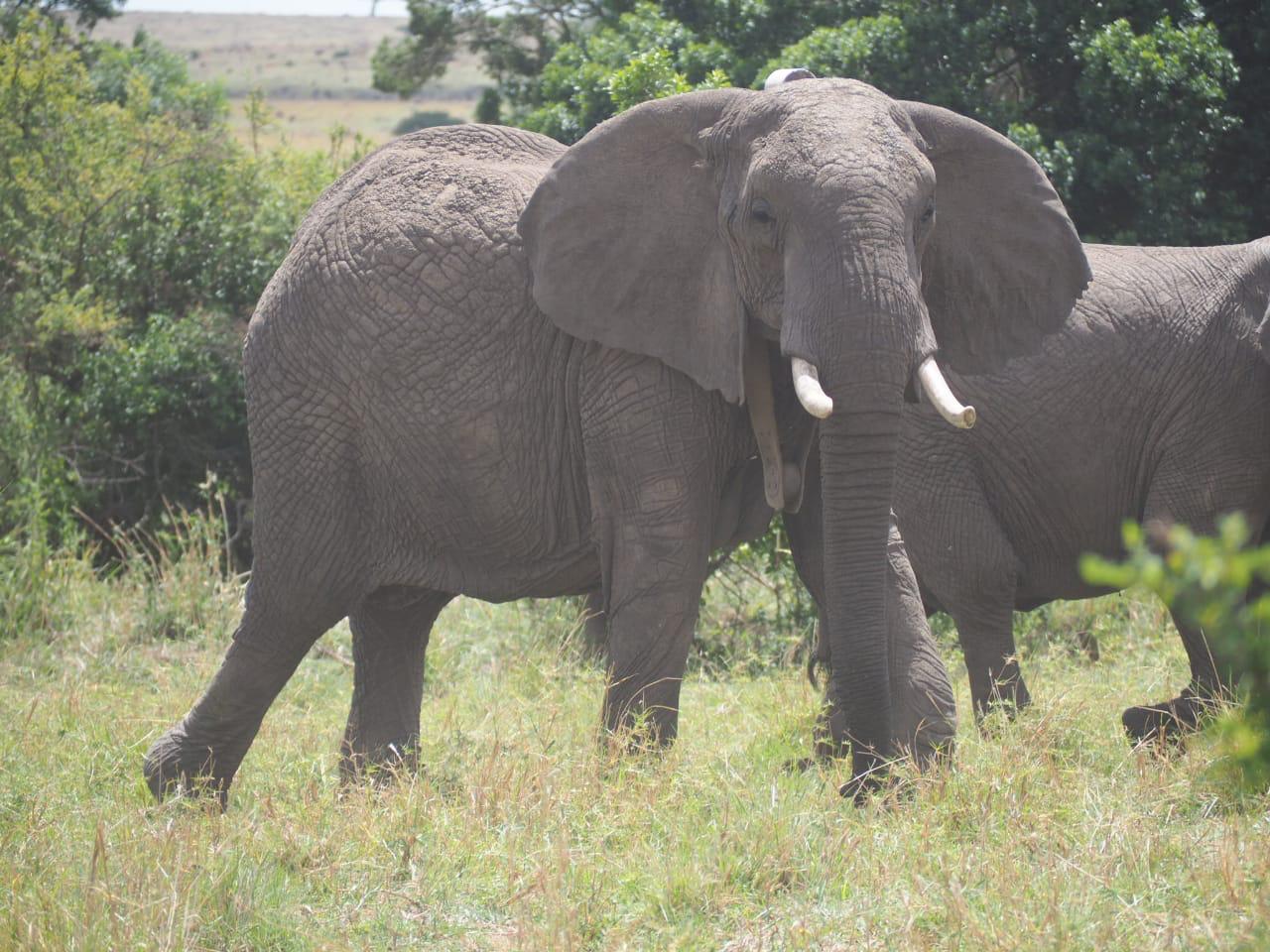
MEP collared elephant Hangzhou pictured with a herd of over 40 elephants.
Finally, On December 22nd, we hosted a staff party at KWS, and it was a good chance for everyone to catch up and enjoy some Nyama Chomatogether. This month we have also started looking back at some of the achievements in 2018 and, in short, we have been very fortunate to strategically increase our areas of operation to include a permanent presence in the Mau and a seasonal presence in the Loita area. MEP rangers in the fourth quarter of 2018 spent 3,822 hours on patrol, covered over 34,100 km in a vehicle, over 19,000 km on a motorbike and walked 3,029 km while on patrol all to ensure the Mara’s elephants and communities are protected.


